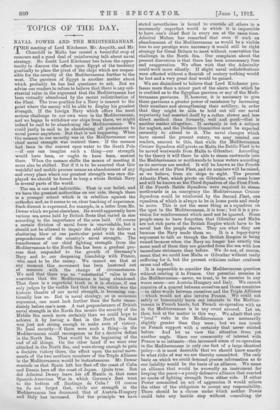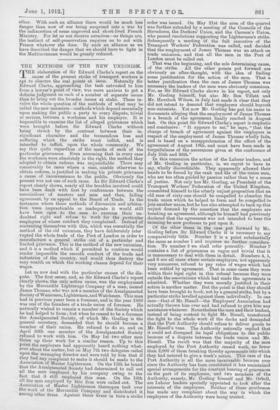TOPICS OF THE DAY.
NAVAL POWER AND THE MEDITERRANEAN. THE meeting of Lord Kitchener, Mr. Asquith, and Mr. Churchill in Malta has caused a bountiful crop of rumours and a good deal of uninforming talk about naval strategy. No doubt Lord Kitchener has taken the oppor- tunity to discuss the effect upon Egypt of the tendency gradually to place the pivot of the ahips which are respon- sible for the security of the Mediterranean further to the west. The garrison of Egypt is another matter about which probably he has had questions to ask. But we advise our readers to refuse to believe that there is any sub- stantial value in the argument that the Mediterranean has been virtually abandoned by the recent redistribution of the Fleet. The true position for a Navy is nearest to the point where the enemy will be able to display his greatest strength. If the foreign Navy which offers the most serious challenge to our own were in the Mediterranean, and we began to withdraw our ships from there, we might indeed be said to be abandoning the Mediterranean. We could justly be said to be abandoning all pretensions to naval power anywhere. But that is not happening. When the menace to our security was in the Mediterranean our ' chief naval strength was centred there. If the menace had been in the nearest open water to the South Pole —if one can imagine such a thing—our strength would have been, or ought to have been, centred there. When the menace shifts the means of meeting it must also be shifted. But if it is to be asserted that this watchful and mobile process means an abandonment of any and every place where our greatest strength was once dis- played we should be forced to keep a whole British Navy in several parts of the world.
The sea is one and indivisible. That is our belief, and we have the greatest authorities on our side, though there is a younger school which is in rebellion against the orthodox and, as it seems to us, clear teaching of experience. Such dissent is expressed, for example, in a, letter from Mr. Dewar which we print elsewhere. He would apparently have various sea areas held by British fleets that varied in size according to the importance of the area held. Of course a certain division of naval force is unavoidable, but it should not be allowed to impair the ability to deliver a shattering blow at one particular point with the vast preponderance of the country's naval strength. The transference of our chief fighting strength from the Mediterranean to the North Sea has been a. gradual pro- cess that responded to the growth of Germany's Navy and to our deepening friendship with France, who used to be the enemy. We cannot see that at . any moment this movement has been hastened out of measure with the change of circumstances. We said that there was no " substantial " value in the assertion that the Mediterranean is being abandoned. That there is a superficial truth in it is obvious, if one only judges by the visible fact that the sea, which was the historic theatre of our naval strength, is becoming con- tinually less so. But in naval strategy, as in economic argument, one must look further than the facts imme- diately before one's nose. A vast preponderance of British naval strength in the North Sea means the security of the Middle Sea much more certainly than we could hope to achieve it by having a fleet in the North Sea that was just not strong enough to make sure of victory. No local security—if there were such a, thing—in the Mediterranean could recompense us for a, decisive defeat in the North Sea. That would be the beginning of the end of all things. On the other hand if we were ever attacked in the North Sea, and were strong enough to gain a decisive victory there, the effect upon the naval move- ments of the two southern members of the Triple Alliance in the Mediterranean would be instantaneous. Mr. Dewar reminds us that Spain left her fleet off the coast of Cuba and Russia hers off the coast of Japan. Quite true. But did Admiral Dewey leave his off Manila in that same Spanish-American War in which Cervera's fleet went to the bottom off Santiago do Cuba ? Of course we do not forget that, while our strength in the Mediterranean has decreased, that of Austria-Hungary and Italy has increased. But the principle we have stated nevertheless is bound to override all others in a. necessarily imperfect world in which it is impossible to have one's chief fleet in every sea at the same time. Admiral Mahan has remarked that even if such an abandonment of the Mediterranean as would be a visible loss to our prestige were necessary it would still be right strategy for Great Britain to meet without reservation the challenge in the North Sea. Our complaint about the present discussion is that there has been unnecessary fuss and exaggeration. We often wish that the Admiralty could work more silently. If slight naval redistributions were effected without a flourish of oratory nothing would. be lost and a very great deal would be gained.
We are disinclined to believe that Lord Kitchener pro- fesses more than a minor part of the alarm with which he is credited as to the Egyptian garrison or any of the Medi- terranean garrisons. If, however, it is necessary to give those garrisons a greater power of resistance by increasing their numbers and strengthening their artillery, in order that they might be able to hold out till our naval superiority had asserted itself by a rather slower and less direct method than formerly, well and good—that is another matter altogether. It certainly is not a subject for neglect, and the Defence Committee must be expected earnestly to attend to it. The naval changes which have caused the present outcry, we may remind our readers, amount to this, that while the Mediterranean Cruiser Squadron still pivots on Malta the Battle Fleet is to be moved westwards from Malta to Gibraltar. According to the theory it will there be able to steam eastwards into the Mediterranean or northwards to home waters according as its services are needed. It will be known as the Fourth Squadron of the First Fleet, and its numbers will be raised, as we believe, from six ships to eight. The present Atlantic Fleet, which pivots on Gibraltar, will come home and will be known as the Third Squadron of the First Fleet. If the Fourth Battle Squadron were required to steam northwards in an emergency the Mediterranean Cruiser Squadron could be reinforced by the Second Fleet, one squadron of which is always to be in home ports and ready to move. This is not the same thing as a squadron on the spot in the Mediterranean, it is true ; but it is a pro- vision for reinforcement which need not be ignored. Some people seem to have forgotten that Gibraltar and Malta are not rich parts of the British Empire which have to be saved lest the people starve. They are what they are because the Navy made them so. It is a topsy-turvy argument to talk as though the British Empire is being ruined because when the Navy no longer has exactly the same need of them they are guarded from the sea with less immediate strictness than before. We do not, of course, mean that we could lose Malta or Gibraltar without really suffering for it, but the present criticism rather confuses cause and effect.
It is impossible to consider the Mediterranean question without relating it to France. Our potential enemies in the Mediterranean—never, we trust, to be enemies in any worse sense—are Austria-Hungary and Italy. We cannot conceive of a quarrel between ourselves and those countries —in other words between ourselves and the Triple Alliance —which would not also involve France. We could not safely or honourably leave our interests in the Mediter- ranean in French hands, but French co-operation with us in the Mediterranean is in any event assured. Let us, then, look at the matter in this way. We admit that our " local " risks in the Mediterranean are necessarily slightly greater than they were ; but we can count on French support with a certainty that never existed before. And let us view the situation from yet another angle. Since our community of interest with France is so intimate—this increased sense of co-operation in the Mediterranean is only one fact of a large identical policy—it is most desirable that we should know exactly to what risks of war we are thereby committed. The only basis on which we could demand precise information as to our liability would be the basis of an alliance. We mean an alliance that would be avowedly an instrument for keeping the peace—a purely defensive alliance that exacted. no quota of fighting strength from either side. If either Power committed an act of aggression it would. relieve the other of the obligation to accept any responsibility. There should be a clause under which neither Power could take any hostile step without consulting the other. With such an alliance there would be much less danger than now of our being surprised into a war by the indiscretion of some unproved and short-lived French Ministry. For let us not deceive ourselves—as things are, the instinct of self-preservation requires us to act with France whatever she does. By such an alliance as we have described the danger that we should have to fight in the Mediterranean would be greatly reduced.







































 Previous page
Previous page